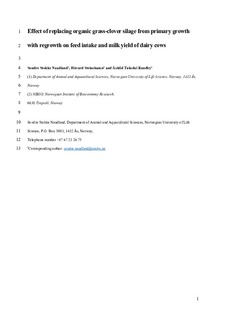| dc.description.abstract | Under Norwegian conditions, diets based on primary growth (PG) silage typically increase milk yield compared to silage prepared from the regrowth (RG). Organic PG, dominated by immature grasses, is often high in energy and low in crude protein (CP), whereas the opposite is the case for organic RG harvests, dominated by clover. Here, we tested the hypotheses that increasing proportions of RG will reduce the total supply of metabolizable energy, but increase the CP intake, and that there is a dietary optimal mix of PG and RG to meet requirements for optimal milk production. Sixteen Norwegian Red cows were used in an experiment designed with four balanced 4 × 4 Latin squares with 21-day periods to evaluate the effect of incremental replacement of PG with RG on feed intake, nutrient digestion, and milk production. Silages were prepared from PG and RG of an organically managed grassland. Treatments comprised silages fed ad libitum with RG replacing PG in ratios of 0, 0.33, 0.67, and 1 on dry matter (DM) basis. Additionally, concentrate was offered with 8 kg for pluriparous and 7 kg for primiparous cows. The PG had higher content metabolizable energy (ME), potentially degradable neutral detergent fiber (NDF), and water-soluble carbohydrates, while RG contained more CP and indigestible NDF. The already mentioned characteristics led to higher intakes of DM, organic matter, NDF, and ME and lower intakes of CP and indigestible NDF with increasing proportions of PG in the diet. Milk yield tended to be higher when PG and RG were offered as a mixture than when fed alone. The milk fat concentration decreased linearly with increasing proportions of RG proportion, while protein concentration was unaffected by diet. This led to a similar production of energy-corrected milk among cows fed diets containing PG while cows fed pure RG diet produced 0.9 kg less daily. Silage energy concentration and energy intake influenced milk production more than CP supply. | nb_NO |
